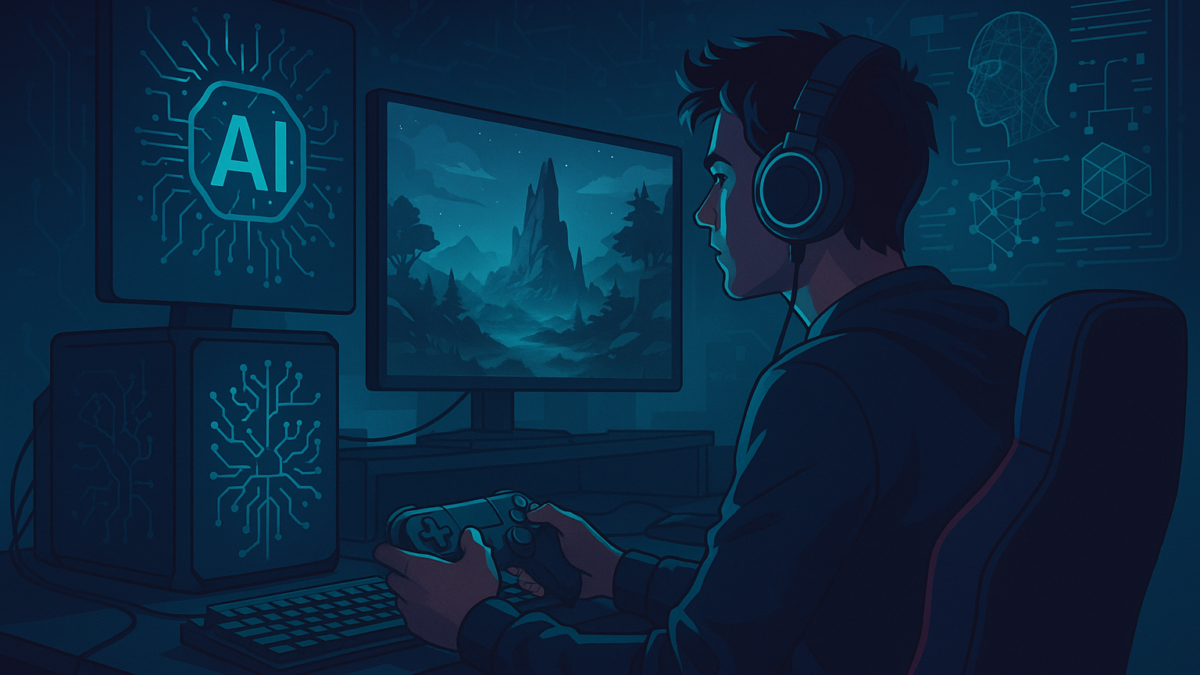Gaming in the Age of AI: How Artificial Intelligence Is Transforming Game Development in 2025
Table of Contents
Introduction
In 2025, artificial intelligence (AI) is no longer a futuristic idea—it’s at the core of modern game development. From creating vast open worlds to generating lifelike NPCs and automating game testing, AI is revolutionizing how games are built, played, and evolved.
This blog dives deep into how analysts, designers, and developers are leveraging AI to reshape the gaming industry. Whether you’re a studio, indie developer, or curious gamer, this is your guide to understanding the power of AI in gaming today.
Procedural Content Generation: AI as Your Level Designer
AI is enabling procedural generation at unprecedented scale. Developers no longer need to manually build every inch of a map or environment—AI can:
- Generate landscapes, dungeons, and cityscapes
- Populate worlds with dynamic objects and events
- Ensure every playthrough offers a unique experience
Example:Minecraft and No Man’s Sky pioneered procedural generation, but 2025 sees more refined, context-aware algorithms that match storyline and difficulty levels to player behavior.
Smarter NPCs: AI-Powered Characters That Think
Gone are the days of static NPCs following rigid scripts. AI now powers responsive, intelligent non-player characters who:
- Learn from your choices
- Adjust dialogue and combat tactics in real time
- Remember past interactions
Thanks to Natural Language Processing (NLP), some games feature NPCs that you can have full conversations with—creating a level of immersion once thought impossible.
Predictive Analytics & Personalized Gameplay
Analysts use AI models to process massive datasets and personalize player experiences. In 2025, games adapt dynamically based on:
- Skill level
- Playstyle patterns
- Session duration and retention data
AI enables:
- Adaptive difficulty that adjusts in real-time
- Tailored missions or rewards based on past behavior
- Player segmentation for better in-game offers and monetization
This leads to better player engagement, higher retention, and longer playtimes.
4Game Testing & Quality Assurance (QA): Faster, Smarter, Better
AI-driven automation has transformed QA and bug testing:
- Detects glitches and inconsistencies across thousands of playthroughs
- Simulates player behavior to uncover edge cases
- Uses image recognition and pattern matching for visual bug detection
This not only saves time but ensures a more stable and polished launch—critical in an age where buggy games can ruin reputations overnight.
AI in Game Art, Music & Voiceovers
In 2025, generative AI tools are empowering creators to:
- Auto-generate textures, 3D assets, and animations
- Compose dynamic, emotion-responsive soundtracks
- Clone voices or synthesize new ones using AI-driven voice models
This reduces production costs and allows smaller studios to compete at AAA levels.
Tools in use:
- Midjourney & DALL·E for concept art
- AIVA and Amper for music generation
- ElevenLabs for AI-generated voice acting
Real-World Example: Ubisoft’s GhostWriter AI
Ubisoft has been using its proprietary AI tool GhostWriter to help narrative teams generate NPC dialogue. Instead of replacing writers, the tool offers first-draft suggestions for background banter, which writers can then refine—saving hundreds of hours per title.
This collaborative AI-human workflow is becoming the new standard in studios worldwide.
Challenges & Ethical Considerations
Despite the massive benefits, AI in gaming presents key challenges:
- Loss of originality: Over-reliance on AI-generated content can lead to repetitive or generic gameplay
- Bias & fairness: AI algorithms can unintentionally discriminate or unbalance game mechanics
- Data privacy: Personalization depends on collecting sensitive player data
- Job displacement fears: Some worry AI tools could reduce demand for traditional game artists or writers
Solution: Developers must adopt ethical AI practices, maintain transparency, and ensure human creativity remains central.
What the Future Holds for AI in Gaming
The integration of reinforcement learning, generative agents, and even AI-powered game directors is on the horizon.
Future trends include:
- AI that generates entire storylines based on world events or player decisions
- AI-powered puzzle generators that adapt to individual thinking styles
- Cross-platform AI that personalizes gameplay across PC, mobile, and console
With companies like Epic Games, Valve, and Unity investing heavily in AI frameworks, the next five years could completely redefine what games are and how we experience them.
Final Thoughts
AI is no longer just a tool—it’s a co-creator in the game development process. Whether designing vast open worlds, animating lifelike characters, or predicting what players want next, AI in 2025 is unlocking a new era of interactive storytelling, scalability, and personalization.
For game developers, the message is clear: embrace AI or risk falling behind.
Building the next big game?
Stay ahead of the curve with AI-powered tools and strategies that elevate your game design, testing, and engagement.
You May Also Like: Will GTA 6 Embrace the Metaverse? Exploring Blockchain, Player Rewards & the Future of Gaming





